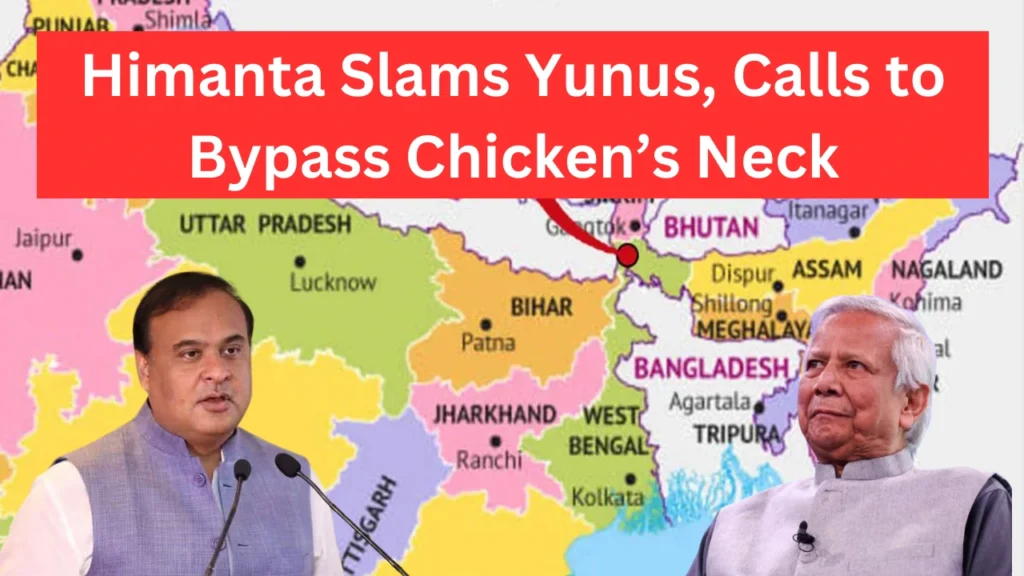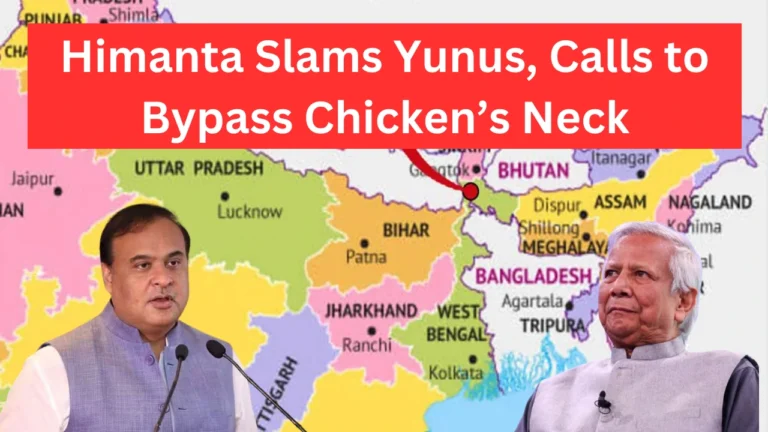In a sharp rebuttal to comments made by Bangladesh’s interim government chief advisor, Professor Muhammad Yunus, Assam Chief Minister Himanta Biswa Sarma termed the remarks as “offensive” and “strongly condemnable.” Yunus, during his recent four-day visit to China, had referred to Bangladesh as “the only guardian of the ocean” for Northeast India, citing the region’s landlocked geography as an economic opportunity for China via Dhaka.

What Did Yunus Say?
Addressing a forum in China, Nobel laureate Muhammad Yunus commented on the geopolitical and economic prospects of Bangladesh’s role in regional connectivity:
“Seven states of India, eastern part of India, called seven sisters… they are landlocked… They have no way to reach out to the ocean. We [Bangladesh] are the only guardian of the ocean for this entire region.”
He further implied that Bangladesh’s unique geographical positioning could serve as a strategic extension of the Chinese economy, allowing the movement of goods from Northeast India to China and beyond through Bangladeshi ports.
Himanta’s Fierce Response on X (formerly Twitter)
Reacting swiftly, Assam Chief Minister Himanta Biswa Sarma denounced the statement, emphasizing that such comments reflect a “persistent vulnerability narrative” regarding India’s Northeast — particularly the reliance on the narrow Siliguri Corridor, also known as the “Chicken’s Neck.”
“Mr. Yunus’s statement is not only offensive but perpetuates a dangerous narrative that undermines India’s sovereignty and strategic interests,” Sarma wrote.
“We strongly condemn this mindset that views Northeast India as dependent or isolated. India has always stood united — physically, politically, and emotionally.”
What is the Chicken’s Neck Corridor?
The Chicken’s Neck or Siliguri Corridor is a narrow 22-km stretch of land in West Bengal that connects the northeastern states to the rest of India. While geographically slender, this corridor is of immense strategic importance to India.
The region — comprising Assam, Arunachal Pradesh, Manipur, Meghalaya, Mizoram, Nagaland, Tripura, and Sikkim — shares international borders with five countries:
- Bangladesh: 1,596 km
- China: 1,395 km
- Myanmar: 1,640 km
- Bhutan: 455 km
- Nepal: 97 km
Despite being landlocked, Northeast India is not cut off. India has already invested significantly in developing multiple road, rail, and air routes to integrate the region with the mainland.
Push for Alternative Connectivity
Sarma called for accelerated infrastructure development to bypass dependency on the Chicken’s Neck corridor:
“It is imperative to build robust railway and road networks both around and underneath the Chicken’s Neck. We must explore new alignments that connect the Northeast directly with the Indian mainland. Engineering challenges may be formidable, but nothing is impossible with willpower and innovation,” he said.
This also comes in the backdrop of earlier internal controversies, including sedition charges against Sharjeel Imam, who allegedly propagated ideas to isolate the Northeast by blocking the Chicken’s Neck during anti-CAA protests.
Geo-Strategic Implications and Concerns
Sarma’s remarks also carried an undertone of strategic caution. By highlighting Bangladesh’s increasing proximity with China and the suggestion of Northeast India serving as a conduit for Chinese trade via Bangladesh, the CM emphasized the need for India to safeguard its sovereignty through strategic infrastructure and diplomatic vigilance.
The reference to Northeast India as an “extension of the Chinese economy” has alarmed not just policymakers but also geopolitical observers, who see it as part of a broader regional chessboard involving China’s Belt and Road Initiative (BRI).
India-Bangladesh Relations: A Delicate Balance
India and Bangladesh share a historically rich and complex relationship. The two nations have collaborated on various trade and transit agreements, including port access to Indian goods via Bangladesh. However, statements like those of Yunus risk straining this relationship if they are perceived as undermining India’s territorial or economic sovereignty.
The controversy has once again brought into sharp focus the strategic significance of the Northeast region, its development imperatives, and the need for secure, self-reliant connectivity with the rest of India. As India pursues its Act East Policy, strengthening its hold over this vital region — economically, politically, and infrastructurally — remains crucial.
While India continues to engage constructively with its neighbors, comments that attempt to frame India’s internal regions as dependent or subordinate to external players are bound to evoke strong reactions, as seen in this case.
Frequently Asked Questions
What did Bangladesh’s interim government chief advisor Muhammad Yunus say about Northeast India?
During a four-day visit to China, Muhammad Yunus referred to the northeastern region of India as “landlocked” and stated that Bangladesh is the only guardian of the ocean for this region. He added that this creates a significant opportunity for China to access and expand economic activities through Bangladesh.
What is the significance of Muhammad Yunus’s statement on regional connectivity between Northeast India and Bangladesh?
Muhammad Yunus suggested that the seven northeastern states of India—often referred to as the “Seven Sisters“—are landlocked and lack direct access to the ocean, positioning Bangladesh as their only maritime gateway. He implied that Bangladesh’s geographic location could make it a vital transit hub for trade and logistics, not only for Northeast India but also as an extension of China’s economic supply chain. This perspective frames Bangladesh as a strategic player in regional connectivity, offering its ports for the movement of goods to and from the Northeast, potentially reshaping regional trade dynamics.
Why did Himanta Biswa Sarma raise concerns about Yunus’s remarks?
Sarma warned that calling Northeast India an “extension of the Chinese economy” via Bangladesh poses a strategic risk. He highlighted the growing China-Bangladesh ties and stressed the need for India to strengthen its infrastructure and maintain sovereignty amid concerns tied to China’s Belt and Road Initiative (BRI).
How could Yunus’s statement impact India-Bangladesh relations?
While India and Bangladesh have strong trade and transit ties, Yunus’s remark risks straining the relationship by appearing to challenge India’s sovereignty. It highlights the need for India to boost self-reliant connectivity in the Northeast and reinforce its Act East Policy.

